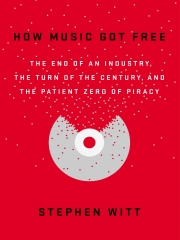How Music Got Free by Stephen Witt
This is a book about the birth of the mp3, the rise and fall of music privacy, and how the music industry dealt with the onslaught. It’s mainly told through the lens of three main characters: the inventor of mp3, a CD assembly factory worker who became one of the top pirates, and the music industry executive Doug Morris. The story is captivating, and it’s great to learn about a phenomenon that I grew up alongside but have never really studied. It brought back memories of my first mp3 player, which I had to hold in a certain way to get the music to play. I still have it – I wonder if it works now.
1) Zwicker, a German acoustics scientist, discovered that the auditory system canceled out noise both before and after a loud crash.
The ‘after’ component seems natural, but the ‘before’ component is somewhat counterintuitive. Ultimately, our system takes a few milliseconds to process sound, and this can be interrupted by louder sounds. One ramification of this discovery is that compression algorithms could assign fewer bits to the few milliseconds before a loud beat.
2) In 1988, a Saipan radio station run by missionaries became the first buyer of a hand-built mp3 decoder.
Later, in 1995, the NHL became one of the earliest enterprise adopters of the mp3.
3) mp2 is not the predecessor of mp3.
Contrary to popular (or my previous) belief, mp2 and mp3 are separate technologies. mp2 is made by the MUSICAM group, backed by Philips, which had sway with the MPEG (Moving Picture Experts Group). mp3 is designed by Brandenburg and his colleagues at the Fraunhofer Society. Since this book is told from Brandenburg’s perspective, the author spends a good amount of time painting this battle of compression standards as a David vs Goliath situation.
4) Fraunhofer started developing AAC to replace the mp3 because mp3 was not selling well commercially.
AAC actually performs better than the mp3. Nowadays (or five years ago), AAC was probably best known as “Apple’s format.” The truth is that AAC is not Apple proprietary technology. Interesting, the first publicly available mp3 encoder (L3Enc) did not include versions for Apple machines because Apple’s environment was too difficult to code for.
5) On IRC, different groups of people raced each other to leak pirated music. This community was called the Scene.
In 1996, the group CDA (Compress Da Audio) released the first officially pirated mp3: Until It Sleeps by Metallica.
6) Morris filed two lawsuits to fight music piracy – RIAA vs Diamond Multimedia Systems and A&M Records vs Napster.
The first lawsuit targeted mp3 players. The second targeted companies that allowed the transfer of copyrighted materials.
7) Omerta is a code of silence that one would not give evidence to the police.
8) Bram Cohen invented BitTorrent in 2001, and the Pirate Bay came online in 2003.
Cognitive dissonance: 1) There’s been no technological progress. 2) So many relevant technologies are actually very new.
9) Authorities want to put people on trial in Virginia.
The population has a high percentage of federal employees. Historically, juries in VA find defendants guilty more than those in any other federal jurisdiction. Very interesting.
10) Doug Morris oversaw the launch of Vevo in 2009.
This was probably the best strategic move made by Morris – more effective than the lawsuits he brought forth that backfired and solidified public opinion against the big record labels.
How Music Got Free is a very informative book that I think most 20-somethings will enjoy. It’s like learning about what happened behind the scenes as we discovered mp3 and torrents and as we watched the downfall of physical albums, the rise and fall of the mp3, the rise (and fall?) of torrenting, and the rise of streaming. It’s crazy how the mp3 is already kind of past tense. Spotify streams in OGG. Even torrenting is somewhat past tense. Torrent traffic used to make up 1/3 of internet traffic. Nowadays, Netflix dominates internet traffic. Such is life.
